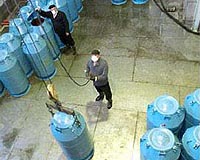 |
Vilnius (AFP) Dec 3, 2010 A four-nation nuclear power plant project in Lithuania was thrown into doubt Friday, as the government said a South Korean bidder had pulled out and another was rejected. Lithuania's deputy energy minister, Romas Svedas, told reporters that South Korea's state energy firm Korea Electric Power Corp (KEPCO) had withdrawn from the race to build and run the plant. "Two weeks after presenting its proposal, KEPCO surprisingly announced that it had withdrawn its bid," Svedas said. "The current situation was unexpected," he said, noting that it remained unclear why KEPCO had pulled out. "As there are no proposals that meet the requirements, a winner has not been selected," he added. Svedas said Lithuanian Prime Minister Andrius Kubilius had written to South Korean President Lee Myung-bak appealing for him to support the project but that the initiative failed to sway KEPCO. KEPCO on November 17 made public the fact that it was bidding for the plant, meant to replace a Soviet-era facility that was shut down at the end of 2009 under the terms of Lithuania's admission to the European Union. Lithuania had tried and failed to convince the EU to let it keep the plant -- its only nuclear power station -- open until the replacement being built along with neighbours Latvia, Estonia and Poland was ready. Kubilius is to visit Poland for talks on Sunday, along with his Latvian and Estonian counterparts. One other bidder had been in the race, but its name was never revealed. Svedas said Lithuanian authorities decided that bid did not make the grade. The failure of the tender did not mean the demise of the power plant plan, Svedas insisted. "We will continue with the development of the project," he said, stressing that the 2020 target for opening the new plant remained "realistic". He said the plan would now enter a "new phase" involving direct talks with all potential investors, including KEPCO. The project is worth between four and six billion euros (5.2-7.9 billion dollars), Svedas said. The Lithuanian government has said the plant's strategic investor could get a stake of 50 percent plus one share. Lithuania itself has been aiming to have a stake of around one-third, but there has been disagreement with Estonia, Latvia and Poland about their relative holdings and power share-out. The former plant, near Ignalina in northeast Lithuania, provided the bulk of the power for this former Soviet-ruled republic of 3.3 million. It was similar to the one that exploded at Chernobyl in then-Soviet Ukraine in 1986, the world's worst nuclear accident. Its closure was part of the deal allowing Lithuania to join the EU in 2004, 13 years after independence from Moscow. The shutdown was a blow for Lithuania, driving up electricity prices amid a deep economic crisis. Lithuania turned to mothballed gas and oil-fired power stations, but the former rely on supplies from Russia. Vilnius's relations with its Soviet-era master Moscow are often rocky.
Share This Article With Planet Earth
Related Links Nuclear Power News - Nuclear Science, Nuclear Technology Powering The World in the 21st Century at Energy-Daily.com
 UN watchdog approves nuclear fuel bank
UN watchdog approves nuclear fuel bankVienna (AFP) Dec 3, 2010 The UN atomic watchdog on Friday voted to set up a nuclear fuel bank, under its auspices, to allow countries access to nuclear energy without risking the spread of atomic weapons. The International Atomic Energy Agency's 35-member governing board approved a United States-sponsored proposal for a 150-million-dollar (112-million-euro) fuel bank, with 28 countries in favour. No country vote ... read more |
|
| The content herein, unless otherwise known to be public domain, are Copyright 1995-2010 - SpaceDaily. AFP and UPI Wire Stories are copyright Agence France-Presse and United Press International. ESA Portal Reports are copyright European Space Agency. All NASA sourced material is public domain. Additional copyrights may apply in whole or part to other bona fide parties. Advertising does not imply endorsement,agreement or approval of any opinions, statements or information provided by SpaceDaily on any Web page published or hosted by SpaceDaily. Privacy Statement |